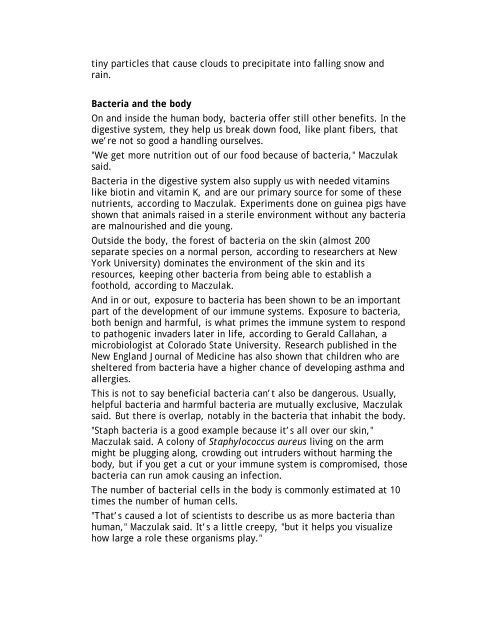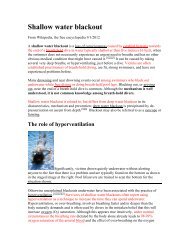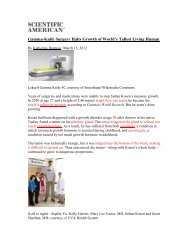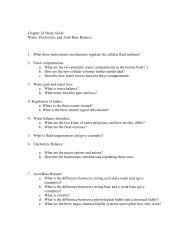Could Humans Live Without Bacteria?
Could Humans Live Without Bacteria
Could Humans Live Without Bacteria
- No tags were found...
Create successful ePaper yourself
Turn your PDF publications into a flip-book with our unique Google optimized e-Paper software.
tiny particles that cause clouds to precipitate into falling snow and<br />
rain.<br />
<strong>Bacteria</strong> and the body<br />
On and inside the human body, bacteria offer still other benefits. In the<br />
digestive system, they help us break down food, like plant fibers, that<br />
we’re not so good a handling ourselves.<br />
"We get more nutrition out of our food because of bacteria," Maczulak<br />
said.<br />
<strong>Bacteria</strong> in the digestive system also supply us with needed vitamins<br />
like biotin and vitamin K, and are our primary source for some of these<br />
nutrients, according to Maczulak. Experiments done on guinea pigs have<br />
shown that animals raised in a sterile environment without any bacteria<br />
are malnourished and die young.<br />
Outside the body, the forest of bacteria on the skin (almost 200<br />
separate species on a normal person, according to researchers at New<br />
York University) dominates the environment of the skin and its<br />
resources, keeping other bacteria from being able to establish a<br />
foothold, according to Maczulak.<br />
And in or out, exposure to bacteria has been shown to be an important<br />
part of the development of our immune systems. Exposure to bacteria,<br />
both benign and harmful, is what primes the immune system to respond<br />
to pathogenic invaders later in life, according to Gerald Callahan, a<br />
microbiologist at Colorado State University. Research published in the<br />
New England Journal of Medicine has also shown that children who are<br />
sheltered from bacteria have a higher chance of developing asthma and<br />
allergies.<br />
This is not to say beneficial bacteria can’t also be dangerous. Usually,<br />
helpful bacteria and harmful bacteria are mutually exclusive, Maczulak<br />
said. But there is overlap, notably in the bacteria that inhabit the body.<br />
"Staph bacteria is a good example because it’s all over our skin,"<br />
Maczulak said. A colony of Staphylococcus aureus living on the arm<br />
might be plugging along, crowding out intruders without harming the<br />
body, but if you get a cut or your immune system is compromised, those<br />
bacteria can run amok causing an infection.<br />
The number of bacterial cells in the body is commonly estimated at 10<br />
times the number of human cells.<br />
"That’s caused a lot of scientists to describe us as more bacteria than<br />
human," Maczulak said. It’s a little creepy, "but it helps you visualize<br />
how large a role these organisms play."
















